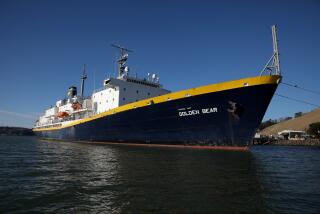San Diego
- Share via
The captain of the first tuna vessel to carry a female observer has sued the federal government to keep the women off his boats because their presence violates his rights to “privacy” and “to be free of unreasonable searches and seizures.”
Skipper Dominic Castagnola’s tuna seiner, the Antonina C, left port Jan. 5 with government observer Susan Taveras aboard, ending a 15-year tradition of male-only observers on tuna boats. The observers are employed by the National Marine Fisheries Service to gather scientific data and ensure that the tuna boat fleet does not exceed its quota of 20,500 porpoise kills in any year.
“What you have here is a federal agent in the workplace and in the home. The vessel is a home,” said August Felando, president of the American Tunaboat Assn., who described Castagnola’s suit as a “test case” for San Diego’s 31 other tuna seiners.
“This raises the entire question of whether the government can create greater risk and greater problems in the operation of the observer program, which certainly intrudes on the privacy of everyone on that vessel . . . and whether that intrusion is necessary and reasonable,” Felando said.
Castagnola objected to Taveras’ presence on the Antonina C and requested a male observer. But the Fisheries Service--which desegregated its observer corps by training four women and 16 men in its most recent class--ordered him to accept her. If Castagnola refused, he would not have been allowed to fish among porpoise schools, a practice that accounts for 94% of all tuna catches, officials said.
Felando has said that bunking women in tiny cabins with three other men aboard tuna seiners will cause privacy intrusions, expose captains to sexual harassment charges and cause anxiety among crewmen’s families. Taveras is bunking with just one man in relative privacy on her first voyage.
The lawsuit, filed Tuesday in U.S. District Court against U.S. Commerce Secretary Malcolm Baldrige and three other federal officials responsible for the program, also claims that women observers are “unnecessary” to protect the porpoises because male observers can do the job just as well.
But Martin Hochman, general counsel for the National Oceanic and Atmospheric Administration, the Fisheries Service’s parent agency, said, “There are other awkward situations that women are placed in, in both the private sector and the government sector. And the government concluded that whatever awkwardness existed is not sufficient basis not to hire women for these jobs.”
In twice-weekly radio reports to shore since her departure, Taveras “sounded very up and high-spirited, and seems to be doing well in terms of compatibility with crew members,” said Norman Mendes, San Diego branch manger for the Fisheries Service.
A second woman observer left San Diego several days ago aboard the seiner Maria C.J., Felando said.
More to Read
Sign up for Essential California
The most important California stories and recommendations in your inbox every morning.
You may occasionally receive promotional content from the Los Angeles Times.













